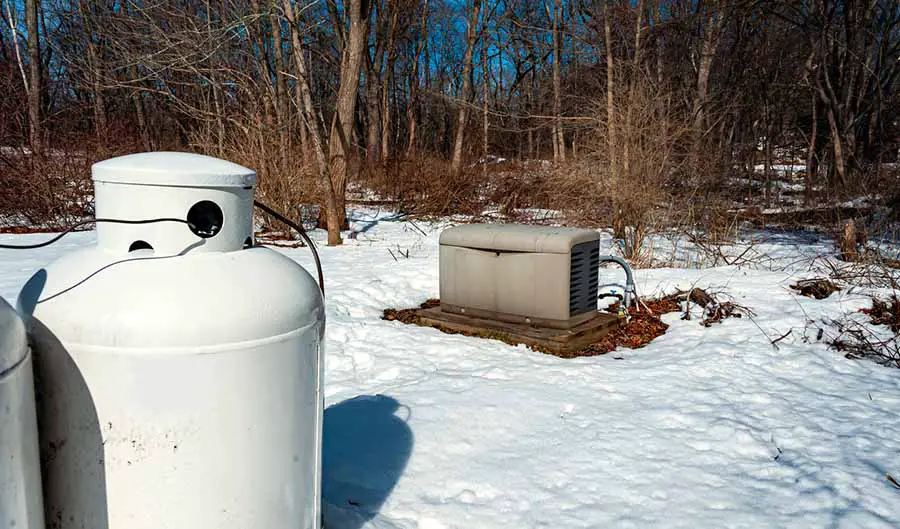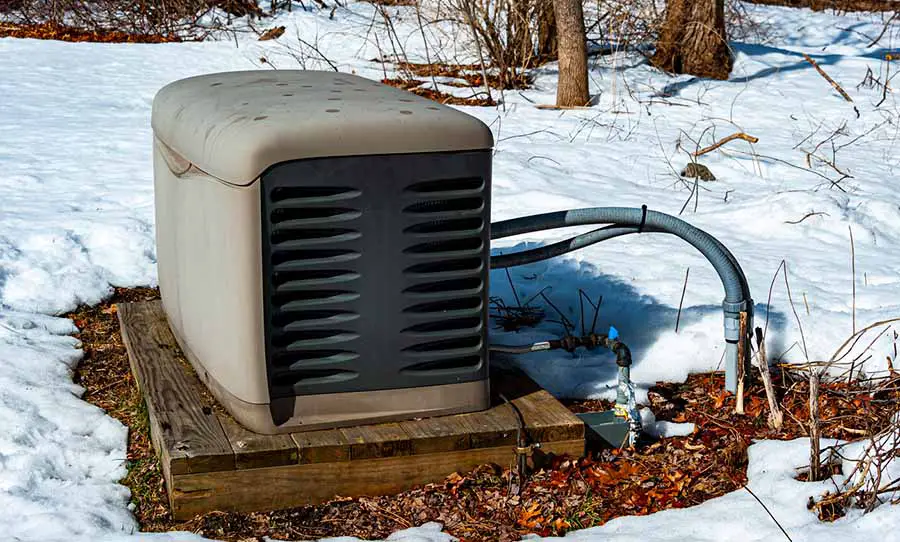
Typically, propane whole house generators will power your entire home when your electricity is off. But to ensure your backup power doesn’t go off, you should have enough propane for your needs.
Generally, whole house generators use 2 to 3 gallons of propane per hour of use. If you use your generator for 40 hours per month on average, that’s 120 gallons of propane per month or 1095 gallons annually. However, how much propane your generator uses per month or year is a dynamic number, depending on various things, including:
- The budget you set for backup power needs
- The size of your home
- Your home’s power requirements
- The capacity of your generator
- How often your power goes off
- Your standby generator’s efficiency
- Your fuel tank’s capacity
- Your climate
This article will discuss how much propane a whole house generator uses monthly and yearly and the factors that influence your fuel usage.
How Much Propane Does a Whole House Generator Use?
Before we determine how much liquid propane your whole-house generator will use, it would be best to understand the critical characteristics of the fuel. For starters, you can only fill up a liquid propane tank to 80 percent capacity. So, a 1000-gallon tank can only accommodate up to 800 gallons of propane.
Below are other crucial characteristics of propane that influence its burn rate:
- Weight: Propane weighs 4.2 pounds per gallon. Therefore a full 100-pound cylinder of liquid propane will have around 23.8 gallons of fuel and will weigh 170 pounds.
- British thermal unit (BTU): One gallon of propane contains approximately 92,000 BTUs. So, if you have a heater that uses 30,000 BTUs per hour, you will keep it on for about three hours using one gallon of propane.
- Horsepower: It takes two horsepower to produce 1000 Watts of energy per hour under load. So, a 5000-Watt capacity 10 HP generator working at 50 percent load will produce 2,500 Watts of power per hour.
- Horsepower Consumption: Under load, one horsepower will consume 10,000 BTU per hour. So, a 10 HP generator will have a whole load of 100,000 BTU.
Factors Affecting How Much Propane a Whole House Generator Uses

Below are some factors that will affect the amount of liquid propane your whole house generator will use monthly and yearly.
1. Your Budget for Backup Power
Liquid propane is not free. It costs money. And how much money you set aside to buy it will determine how much propane your whole house generator can use monthly or yearly.
Studies show that about 5 percent of Americans use propane for heating needs, and they spend an average of $2.30 per gallon on the fuel.
American households spend $117.65 per month and $1,411.8 per year on electricity bills. So, if you intend to run your generator while considering the national average purchase costs, you can afford to buy and use 613.82 gallons of propane to power your whole house generator for the year. That translates to 51.15 gallons per month.
On the other hand, if you intend to use it only half the time, you would only need 306.91 gallons of fuel per year and about 25.58 gallons each month.
Therefore, the larger your energy budget, the more gallons of fuel you can afford to buy in any given year.
2. The Size of Your Home
The size of your home affects the amount of energy you use on any given day. Bigger homes tend to cost more regarding energy expenses. That’s because you have more and larger spaces that need heating or cooling. Also, these rooms in your house will include more electrical appliances and lighting fixtures that you will likely use.
Generally, depending on your location, you will need anywhere from 30 to 60 BTU per square foot per hour to heat your home during the winter months.
Taking an average of 45 BTU per square foot per hour, you will need 45,000BTUs to heat a 1,000 square foot home, 90,000BTUs for a 2000 square foot home, and 225,000 BTUs for a 5,000 square foot home per hour.
How much propane you need will depend on how long you intend to power your whole house generator.
Assuming your power tends to go off entirely about three months (90 days) of the year during winter, you will need enough propane to power your whole house generator throughout. Since each gallon of propane contains 92,000BTU, you will need about:
- 105.65 gallons of propane to power a 1,000 square foot home continuously for 90 days.
- 2,113.04 gallons of propane to power a 2,000 square foot home continuously for 90 days.
- 5,282.61 gallons of propane to power a 5,000 square foot home continuously for 90 days.
3. Your Home’s Power Requirements
What do you spend money on regarding energy expenses? It would be best to answer that question if you are wondering how much propane you would need.
Your power requirements depend on what you want to keep on using your standby generator. It would help if you listed down the appliances you have and their wattage or BTU consumption per month.
Below are some examples of electrical appliances and their power estimates:
- Refrigerator: 725 Watts
- Flat-screen TV: 120 Watts
- Toaster: 1400 Watts
- 40-Gallon water heater: 4,500 Watts
- Laptop: 50 Watts
- Dehumidifier: 785 Watts
- Hairdryer: 1,200 Watts
- Washer and dryer: 5500 Watts
- Microwave oven: 1100 Watts
If you were to power all these things simultaneously for an hour, your whole house generator would need to provide 15,380 Watts at any given time. You would need a total of 30.76 horsepower to provide that wattage, which consumes 307,600 BTUs under load per hour.
Suppose you need to produce that kind of backup power for ten days of the month. In that case, your whole-home generator would consume 3,076,000 BTUs per month, which would translate to 33.44 gallons of liquid propane.
In a year, you would require 401.28 gallons of propane to keep all the above appliances on when your primary power source goes off.
4. The Capacity of Your Generator
A generator’s capacity is its ability to provide a specified quantity of power when operating at full blast. It is usually measured in megawatts (MW) or Kilowatts (kW). And you can find whole house generators for residential use with capacities as high as 50kW.
To determine the right generator for your needs, you need to consider the peak requirements of all your electrical appliances and electric circuits. But it would help if you also tucked in an additional 20 percent of your total wattage to ensure you have enough power.
A typical American household uses 10,715 kWh each year. Assuming you lose power 10 percent of the time in any given year, you need to provide 1,071.5kWh via your propane whole house generator.
It takes two horsepower to produce 1kWh (1000 Watts for an hour) of energy, which translates to 535.75 horsepower to create 1,071.5kWh via your generator.
Since each horsepower consumes 10,000 BTU, you would need to use 5,357,500 BTU to power your home for 10 percent of the year when your primary source of electricity fails. And that would require 58.24 gallons of propane.
5. How Often Your Power Goes Off

The number of hours you spend in the dark will also influence how much propane you need to buy. The more hours you lack electricity, the more propane you would need to stock up.
Some propane generators consume two to three gallons of propane per hour. So, if you need power for 100 hours in any given month, you would need 200 to 300 gallons of liquid propane. And if you need backup power for 1200 hours of the year, you would require 2,400 to 3,600 gallons of fuel.
That said, your fuel consumption per hour would largely depend on whether your generator is running on a full load and how much power it can produce per hour.
For example, a 30kW generator for a large residence will produce 30,000 Watts per hour while running full blast. Since you need two horsepower to produce 1000 Watts of energy, it translates to 60 horsepower. If you have no idea what your generator’s capacity is because it only states volts and amperes, multiply the two to get its capacity in Watts.
However, we know that one horsepower requires 10,000 BTU. Therefore, 60 horsepower equals 600,000 BTU. And since one gallon produces 92,000BTU, your 30kW propane whole house generator will require 6.52 gallons of propane per hour.
Thus, you can use that number and multiply it by the total power outage hours you experience per month or year to determine how much propane you would need during that time.
6. Your Standby Generator’s Efficiency
While generators under load can operate at full blast, they do not have to. Sometimes, they provide less power than what you need because their efficiency is lower than you think.
For example, if you have a 10,000 Watt generator that produces only 7,000 Watts, it’s 70 percent efficient. So, you may need to use more propane to deliver the power you need to your property. And that would increase your total fuel usage over the course of any given month or year.
However, the amount of extra propane you require will depend on how efficient your generator is. So, it’s challenging to calculate beforehand, though you can estimate it.
For example, if you needed 100 gallons of oil to produce the backup energy you need at 100 percent efficiency, you would need more if that number drops to, say, 70 percent. So, you may now need about 143 gallons to cater for the energy losses within the system to get a similar amount of power.
To improve your generator’s efficiency, you should ensure you buy a high-quality generator and maintain it regularly when the need arises.
7. Your Fuel Tank’s Capacity
If you feel that you are using excessive liquid propane compared to what you used to, it would be best to investigate the fuel tank. It may be leaking and causing you to lose fuel even before you use it, which may be why you are using more propane than you anticipated.
Also, remember that you can only fill a fuel tank up to 80 percent of its capacity. Suppose you have a 500-gallon tank. In that case, you can only obtain 400 gallons worth of gas. That is not a problem when you are dealing with honest suppliers. But if you deal with unscrupulous people, you will not know if you have less gas if you don’t confirm it. So, you may need to use more than your calculations or the gauge show.
In addition, propane in a tank at high temperatures will expand. And you will end up getting less gas than you assumed you had. As a result, you would need to refuel your tank more times than you planned so you can continue powering your whole house generator when the need arises.
To reduce the chances of getting less propane than you need, consider weighing your gas. Ideally, one gallon of propane should weigh about 4.2 pounds. So, a 500-gallon tank should weigh around 2,100 pounds minus the tare weight of the tank. And a 20-pound gas tank would contain 4.76 gallons of propane.
8. The Environment Where You Live
Excessively cool climates result in higher energy costs due to the need to heat your home. And a hot environment would require less heat. For that reason, you would need to use more propane to power your generator in such areas should the electricity go off.
For example, you will need 45,000BTU to heat a 1000 square foot home in a standard climate. But a similar-sized home would require 30,000BTU in a hot environment and 60,000BTU in a cold environment.
Assuming you had a 1000 square foot home in each of the three climates and required 1000 hours of backup power a month, you would need 45 million BTU, 30 million BTU, and 60 million BTU, respectively. That translates to 489.13 gallons of propane for the standard home, 326.1 gallons of fuel for the house in the hot climate, and 652.18 gallons for the cold climate residential property.
Final Thoughts
The truth of the matter is that there is no one size fits all solution regarding a whole house generator’s propane needs. Each homeowner will require different amounts, depending on how much they are willing to spend per year, where they are, the size of their home, and the generator’s capacity.
In addition, various climates will pose varying heating needs. Also, the number of hours one spends dealing with power outages or off-grid will impact fuel usage. For all these reasons, it would be best for you to learn the basics of calculating how many gallons your whole house generator needs so you can estimate how much liquid propane you will use in any given month or year.

